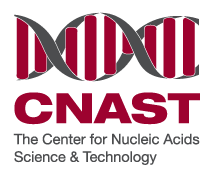
Carnegie Mellon Center for Nucleic Acids Science and Technology Receives $3.1M From DSF Charitable Foundation To Develop Synthetic Nucleic Acids
Gift Will Allow Center To Create Synthetic Molecules Geared Toward Understanding and Treating Genetic, Neurodegenerative and Infectious Diseases
By Jocelyn Duffy
PITTSBURGH—The DSF Charitable Foundation has given $3.1 million to Carnegie Mellon University's Center for Nucleic Acids Science and Technology (CNAST) to enable the multidisciplinary center to apply synthetic chemistry solutions to real-world problems, including the diagnosis and treatment of infectious disease, neurodegenerative disorders and cancer.
"The DSF Charitable Foundation's extraordinary support for CNAST at Carnegie Mellon will have an impact on many lives," said Subra Suresh, president of Carnegie Mellon University. "This pathbreaking research will advance the understanding of cellular processes and help to shape the way we diagnose and treat many kinds of disease."
CNAST does extensive research on peptide nucleic acid (PNA), a synthetic analog of DNA and RNA. DNA and RNA have varying sequences of subunits called nucleotide bases. The sequence of these bases is critical to normal cellular function, and errors in these sequences are the hallmark of genetic disease. Although synthetic, PNA contains the same nucleobases as natural DNA and RNA. Scientists can program the PNA molecules to correspond to the genetic sequences known to play a role in disease. The PNA molecules enter the cell and bind to the targeted segment of DNA or RNA. As a result, PNAs have the potential to identify certain gene sequences and to block gene function — giving them enormous promise for diagnostics and therapeutics.
"DNA and RNA are involved in many critical and tightly regulated cellular processes," said John Woolford, professor of biological sciences and co-director of CNAST. "By targeting these molecules we can better understand cellular function and create the next generation of chemical tools."
The DSF Charitable Foundation initially funded CNAST in 2010 with a $3.9 million award. Since then, CNAST researchers have made many advances, including promising work on a next-generation synthetic nucleic acid called gammaPNA. In preliminary studies, they found that the properties of gammaPNA hold great promise for diverse applications, including the rapid diagnosis of infectious disease and the treatment of cancer and bacterial infections. In the last four years, CNAST scientists have published more than 100 papers and attracted close to $5 million in additional funding. They also have founded a startup company, PNA Innovations, which manufactures gammaPNAs for use in research. GammaPNAs are currently being studied by researchers throughout the United States, Europe, Asia and the Middle East.
"We are extremely thankful to the DSF Charitable Foundation," said Bruce Armitage, professor of chemistry and co-director of CNAST. "Their generosity has given, and will continue to give, many researchers and students here at Carnegie Mellon and at the University of Pittsburgh the opportunity to explore untested ideas that have the potential to have wide-reaching impact."
With the new gift from the DSF Charitable Foundation, CNAST researchers plan to further develop gammaPNA technology for use in in vivo experiments. They will focus on developing molecules that can be used to understand the fundamental biology behind some of the most pressing human health problems: neurodegenerative diseases, including Parkinson's disease, Huntington's disease and amyotrophic lateral sclerosis (ALS); cancer and aging; infectious disease; and disorders caused by genetic mutations.
Under the direction of Associate Professor of Chemistry Danith Ly, CNAST also will begin to develop the next generation of PNAs called Janus PNAs. This PNA is double sided, which will allow it to bind to both strands of a DNA or RNA molecule, resulting in increased stability and a better ability to target changes in the genetic sequence.
The gift from the DSF Charitable Foundation also will help to educate and train the next generation of scientists by providing support for graduate students and postdoctoral researchers while bolstering CNAST's award-winning K-12 outreach program, DNAzone.
Originally published: https://www.cmu.edu/mcs/news-events/2014/0918-DSF-Gift-CNAST.html